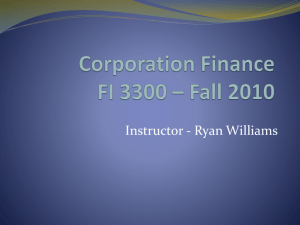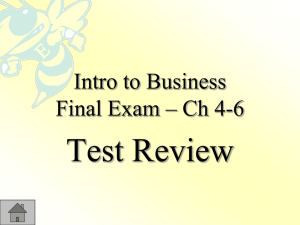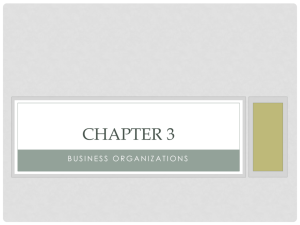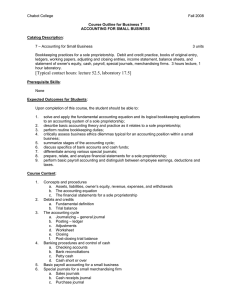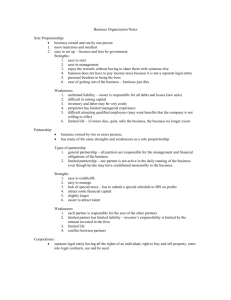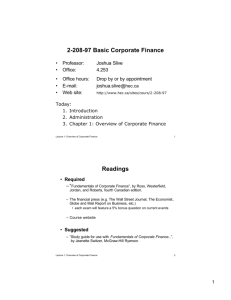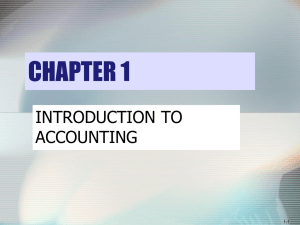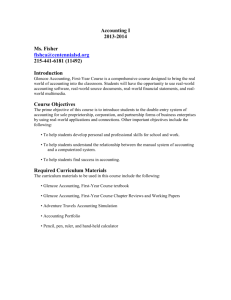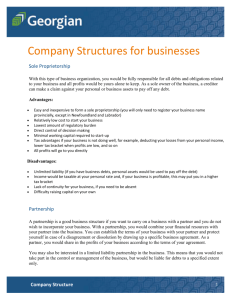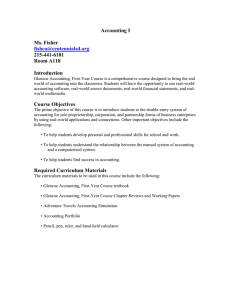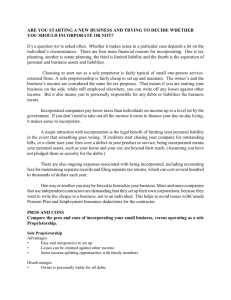Corporation Finance FI 3300 - Ryan M. Williams at The University of
advertisement
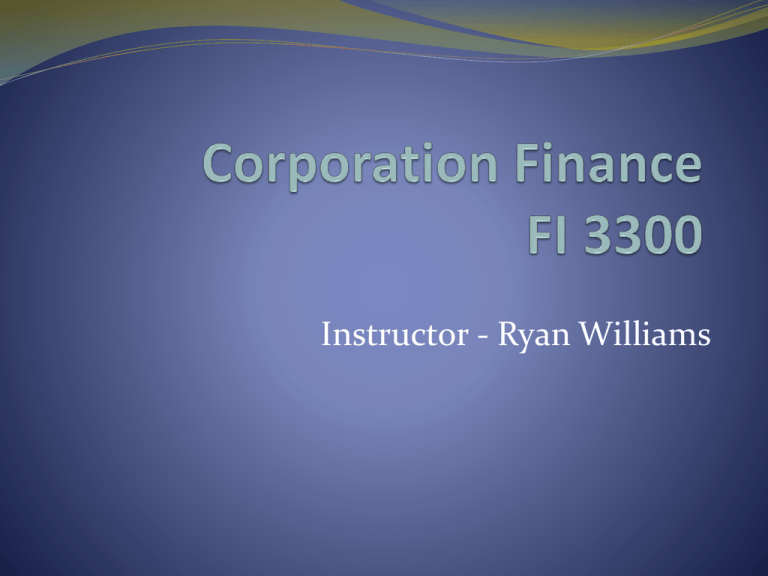
Instructor - Ryan Williams My information Ryan Williams Email: rwilliams83@gsu.edu Website: myrobinson.gsu.edu, Ulearn, http://www.ryanwilliams7.com Office location: RCB #1217, 12th floor. Office phone: 404-413-7316 OFFICE HOURS: Wednesdays at 2:30-4:00 pm or by appointment. Today’s Agenda Quick summary of syllabus Discussion of course My expectations Chapter 1 – Introduction Math Skills Chapter 2 – Income Statement and Balance Sheet Syllabus – Important Highlights Attendance policy – Department-wide! On this – you are allowed to miss two weeks of class. That means only TWO classes. I reserve the right to pass the attendance sheet at any point in time. Exam 1 Exam 2 Final Exam Grading Policy Two midterms: 25% each One Final Exam: 40% Quizzes: 10% We will have 6 quizzes and I will drop the lowest 2. (1 out of first 3, 1 out of last 3). If you miss a class you will receive a 0% for the quiz. Texts Main text: “Lectures in Corporate Finance”, 5th ed., by Jayant Kale and Richard Fendler. Optional: 12-week subscription to The Economist, cheap student rates. Go to http://www.economistacademic.com and use Faculty ID code 6105. Calculator Texas Instruments BA II Plus HP also makes a version Can use NO calculator with a memory We have used calculators available for $20. First come, first serve. Contact Prof. Genna Brown gbrown@gsu.edu Course Outline Split into 3 sections: 1) Blending Accounting and Finance Financial Statements, F.S. Analysis, Fin. Mngt 2) Valuation from an Investor’s point of view Time value of money, valuing stocks, valuing bonds 3) Valuation from a CFO’s point of view Capital Budgeting Course outline - 2 Course gets progressively harder over time. Keep up with the work, if you start to fall behind come to my office hours or form study groups. Classroom rules Cellphones OFF – If your phone rings, I get to answer it. (Also true for me). No texting. If I see you texting you will be asked to solve a problem on the board. I prefer no laptops. However, if you take notes on the laptop, please sit near the back of the classroom so you do not distract students behind you. Why are you here? Learning Objectives 1. 2. 3. 4. 5. Identify the three main subject areas in finance Know the different forms of business organization and discuss the agency problem Define the goal of corporate financial management Compare/contrast finance and accounting Understand how cash affects value Why is finance important? A horrible product (usually) dooms a business. A great product is not enough - horrible financial management coupled with a great product (usually) also dooms a business. 3 subfields of finance Financial markets and institutions (or Banking) = Middleman Investments = Surplus (they invest money in stock, bonds, and savings accounts) Corporate Financial Management (or Corporate Finance) = Deficit (they take money from investors and buy stuff) *Identifying, managing, and valuing risky cash flows is the goal of finance* Basic forms of Business Organization Sole proprietorship Partnership Corporation Advantages/Disadvantages? Ownership structures Type Ownership Ability to Raise Capital Liability Sole •100% owned by a Proprietorship single individual •Owner usually manages company Difficult Unlimited personal liability Partnership Two or more individuals Less difficult than Sole Proprietorship Similar to Sole Proprietorship Corporation Typical separation of owners and managers The least difficult Limited to of all forms owner’s initial investment Also taxation and liquidity differences Agency Problem Getting the agent (the person running the business) to act in the interest of the principal (the shareholders who own the business). Financial manager’s goal Maximize value of the firm. Same as maximizing stock price. NOT the same as “maximizing profits”. Why not? She accomplishes this goal by two basic decisions: How to get money (raise capital), and what to do with it (real investment). Accounting and Finance Accounting USUALLY deals in Book Value (i.e. cost) Finance USUALLY deals with Market Value (what someone would pay you for it today). Accounting is historical data (annual reports, 10-K filings, etc). Finance attempts to project future data – BUT YOU NEED TO UNDERSTAND ACCOUNTING TO DO THIS Cash and Value Value = all future expected cash flows discounted by their riskiness (we will slightly refine this definition later). CASH is the only thing that matters here! This may seem counterintuitive right now, but should be more clear when we look at Stock Valuation in Chapter 9. Class Summary – Why should you care? After the introductory accounting chapters, this entire class is associated with VALUE. Specifically, how to value a bond, a stock, or a new project for a company. Next class Quiz 1 Math Test
